Testing and Exercising Phase for BCM Planning Methodology for Hotel
Introduction to Testing and Exercising
The Testing and Exercising (TE) phase is one of the most critical components of BCM in the hotel industry.
After the BCM Plan has been developed, it must be thoroughly tested to ensure it works effectively in a real crisis scenario.
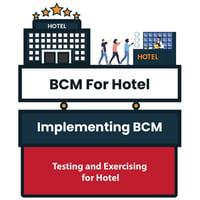 basic and advanced tests designed to validate the plan's practicality, identify weaknesses, and ensure all staff are prepared to respond quickly and efficiently in an emergency.
basic and advanced tests designed to validate the plan's practicality, identify weaknesses, and ensure all staff are prepared to respond quickly and efficiently in an emergency.
 Testing helps reinforce preparedness, build confidence, and uncover areas for improvement. It ultimately enhances the hotel’s operational resilience and minimises the impact of disruptions on guest services.
Testing helps reinforce preparedness, build confidence, and uncover areas for improvement. It ultimately enhances the hotel’s operational resilience and minimises the impact of disruptions on guest services.
TE can be broadly categorised into two groups: Initial Tests and Advanced Tests. Initial tests are designed to assess individual components of the BCM Plan and ensure that staff understand and execute basic recovery procedures.
Once these basic tests are completed, more advanced exercises can be conducted to test the coordination of multiple functions, simulate more complex scenarios, and evaluate the hotel’s ability to respond to high-pressure situations.
These progressive tests ensure the BCM Plan is effective across all response and recovery stages, from initial actions to full-scale recovery.
Initial Tests
Component Tests
Component tests evaluate the functionality of individual elements of the BCM Plan. They are designed to check the performance of specific systems, tools, or procedures, ensuring that each part of the plan works as expected in isolation.
For example, a component test might involve testing backup communication systems, such as emergency phone lines or mass notification systems, to ensure they function properly during a crisis.
Another example could be testing the backup power systems to confirm that critical areas, such as the front desk and kitchen, have access to power in the event of a power failure.
These tests and exercises are relatively simple and should be conducted regularly to ensure that all BCM Plan components are operational.
Call Notification Tests
Call notification tests ensure the hotel’s emergency contact lists are accurate and up-to-date. In this test, key personnel, external partners, and vendors are contacted to confirm that communication systems are functional and that notifications can be sent quickly and efficiently.
This test helps identify issues such as outdated contact information, delayed communication, or confusion over roles and responsibilities.
During this exercise, participants consistently notify staff and external stakeholders, such as suppliers, emergency responders, and government authorities.
Call notification tests are critical to ensuring that the hotel can communicate effectively during an emergency and provide opportunities to refine communication procedures.
Walkthrough Exercises
Walkthroughs or tabletop exercises are conducted to test the plan’s overall structure and flow. These exercises are typically performed in a meeting room, where key personnel review the plan step by step and discuss the roles and responsibilities of each team member during a crisis.
The goal is to ensure everyone understands their tasks and actions during an emergency.
In these exercises, participants may walk through different emergency scenarios, such as a fire, flood, or IT system outage, and discuss how they would respond according to the BCM Plan.
Walkthrough exercises are an excellent way to familiarise all team members with the plan and identify gaps or unclear procedures before a real crisis occurs.
Advanced Tests
Integrated Tests
Once the basic tests have been mastered, integrated tests can be conducted. Integrated tests involve a coordinated effort between multiple departments or functional areas within the hotel.
These tests assess how well different departments—such as guest services, housekeeping, maintenance, and IT—collaborate to implement the BCM Plan in a crisis scenario.
For example, in a significant disruption, such as a fire, integrated testing may include checking how the front desk's evacuation procedures align with the security team’s efforts to account for guests and staff.
These tests help ensure that the BCM Plan is effective in isolated scenarios and that the hotel can respond cohesively and smoothly to a complex, multi-faceted emergency.
Integrated tests require cross-departmental coordination, clear communication, and prioritising actions based on the situation.
Simulation Tests
Simulation tests are more realistic, high-fidelity exercises replicating emergencies as closely as possible. They are designed to evaluate the hotel’s ability to respond to real-world crises in a controlled yet dynamic environment.
For instance, a simulation test could involve a full-scale fire drill in which the hotel staff responds to the fire alarm, evacuates guests, and implements recovery strategies.
The scenario may be designed to simulate various disruptions, such as a guest medical emergency or a large-scale IT outage. It requires the hotel’s crisis management team to react in real-time.
These tests assess decision-making, coordination, and the effectiveness of recovery procedures. Simulation tests are typically longer and more complex than earlier exercises, comprehensively evaluating the hotel’s crisis management capabilities.
Live Tests
Live tests are the most advanced form of testing. They involve executing a real-time crisis simulation that mimics the impact of an actual disruption. In a live test, the hotel would activate the BCM Plan as if a real crisis were occurring, with all relevant staff, departments, and external partners participating in the exercise.
This may include partial or full-scale evacuations, the activation of backup systems, and the recovery of critical services. The goal of live tests is to fully assess the hotel’s readiness, testing not only the plan itself but also the reactions of staff under pressure.
Live tests are often conducted in collaboration with external agencies such as emergency responders or regulatory bodies, and they provide the most thorough assessment of the BCM Plan’s effectiveness.
Due to their complexity and resource requirements, live tests are usually conducted less frequently but are invaluable for identifying weaknesses in response strategies and coordination.
Summing Up...
The TE phase ensures that the hotel’s BCM Plan is effective and can be executed smoothly during a crisis.
Conducting a range of tests, from basic component checks to advanced live simulations, can help the hotel assess its preparedness, identify weaknesses, and improve its recovery strategies.
Initial tests such as component tests, call notification drills, and walkthrough exercises lay the foundation for more advanced tests, including integrated tests, simulation exercises, and live tests, which challenge the hotel’s ability to respond cohesively to complex disruptions.
Ultimately, these exercises validate the BCM Plan and help foster a culture of preparedness within the hotel. They ensure that all staff members are confident and capable of responding effectively during emergencies.
More Information About Business Continuity Management Courses

 To learn more about the course and schedule, click the buttons below for the BCM-300 Business Continuity Management Implementer [B-3] course and the BCM-5000 Business Continuity Management Expert Implementer [B-5].
To learn more about the course and schedule, click the buttons below for the BCM-300 Business Continuity Management Implementer [B-3] course and the BCM-5000 Business Continuity Management Expert Implementer [B-5].
![Register [BL-B-3]*](https://no-cache.hubspot.com/cta/default/3893111/ac6cf073-4cdd-4541-91ed-889f731d5076.png) |
 |
 |
 |
 |
 |
![FAQ [BL-B-3]](https://no-cache.hubspot.com/cta/default/3893111/b3824ba1-7aa1-4eb6-bef8-94f57121c5ae.png) |
If you have any questions, click to contact us.
|
 |
 |
 |
 |


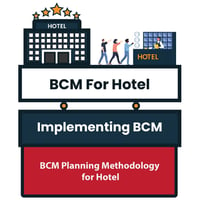
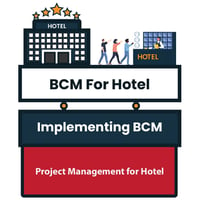
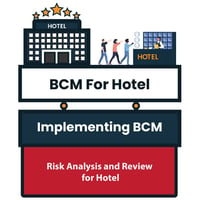
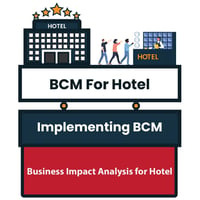
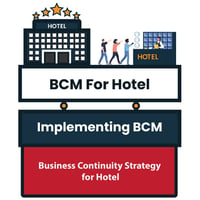
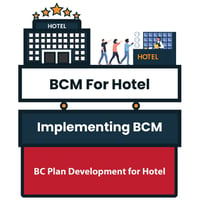
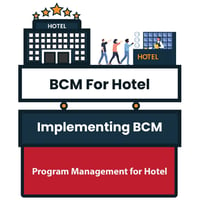
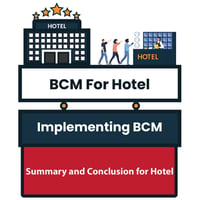
![Email to Sales Team [BCM Institute]](https://no-cache.hubspot.com/cta/default/3893111/3c53daeb-2836-4843-b0e0-645baee2ab9e.png)

